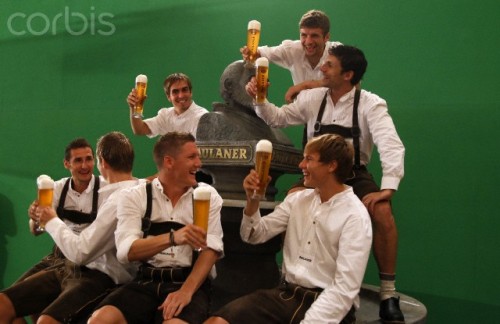A necessary end
The Roman Empire, by Wolfgang Schreier, Bonn 2003
Caesar travelled from Pontus to Syria by the land route, passing the Cicilian gate in early 41 BC. While he moved with his troops Pishdad managed to drive Calatinus out of Antioch. While loosing the important city, Calatinus managed to fully preserve his legions, withdrawing to Tarsos and waiting for Caesars arrival. In April 41 BC Calatinus and Caesar met for the first time in nearly ten years. Caesar took over his troops, sent him home to Rome with the instructions to have him celebrate a triumph.
Calatinus the younger handing over command to Caesar.
 Pishdad, an able general
Pishdad, an able general
The Roman general continued to march against Antioch trying to face Pishdad in battle. The Parthian commander became cautious, knowing that the enemy he faced was much more able then Calatinus.
Pisdhads army withdrawing from battle. The Romans refered to the Parthians as 'girls pretending to fight'.
With Pishdads withdrawal in August 41 BC Antioch was back in Roman hands again, but was severely damaged by battle and plundering. Caesar immediately started to march to the Parthian border where he spent the winter. His plan was to finally invade the Parthian lands and defeat Pishdad.
Caesar invading Parthia.
On the 2nd of May 40 BC it finally came to the Battle of Birtha: Caesar was facing Pishdad
The Battle of Birthia.
Caesar, being in unknown terrain, had unfavourable starting position.
The Romans imidiatley started moving upwards to get into a better position.
 The battle itself started to be tense and fighting took place for several hours.
The battle itself started to be tense and fighting took place for several hours.
Roman soldiers bracing for the impact of the infamous Cataphracts...
...and the line holds.
With Pishdads main army engaged in close battle Caesar still had enough reserves to manouver at his will.
Once again the Macedonian cavallry encircled the enemy and charged into the back.
Pishdad was killed after several hours of fighting. That tipped the battle in favour of the Romans...
...since most Parthians lost their will to fight.
Caesar ordered to chase the Parthian army and destroy it as a whole.
And his plan worked, Pishdads army was utterly vanquished.
The Parthians were defeated and the road to Edessa was open. Immediately after the battle Caesars officers approached the victor and offered him the title ‘Magnus – the great’ and the title Basileus (king) referring to Alexander the Great. Caesar refused again – much like he did during his Anatolian and Syrian campaign. But something changed this time; Caesar actually hesitated accepting the title of Alexander the Great. He still wanted to defeat the Parthians, but his plan was to return to Alexandria after his campaign and visit the grave of the famous Greek. His intentions are unclear, but it seems that Caesar was trying to get on the same level as Alexander.
Helenos – The life of Julius Caesar
(written about 100 AD)
After his great victory the Parthian king Phraates immediately sent an envoy to Caesar Asiaticus to limit the damage at hand. Phraates knew that with Pishdad gone the whole western part of his empire was defenceless.
For the moment Caesar did not think about making peace with the Parthians. He left his army and rode with a small envoy to Edessa. When he entered the city on the 18th of June 714 ab urbe Condita [40BC] everyone was celebrating their liberator. A tremendous parade was staged and Caesar was greeted like the Hellenic kings of old. He prepared a much anticipated speech to the population: “My dear citizens of Edessa, friends to the Roman people, I have come to liberate this jewel of a city from the Parthian tyranny. Phraates is helpless and there is nothing standing in your way of freedom. Just as we Romans protect our liberty and freedom, so do the citizens of this city. And you shall have it.”
Caesar remained two weeks in Edessa, planning his future campaign against the rest of the Parthian empire. He returned to his army on the 7th of July preparing to march into Edessa with his legions peacefully.
Everything seemed to go well for Caesar Asiaticus, when he suddenly fell ill on the 9th of July. Confide to bed he ordered his master of horses and second in command Marcus Antonius to gather the best doctors around. A day later a group of Greeks were studying and treating the illness of the great general. It seemed that Caesar had inhaled bad air during his travels, which was causing sever fever.
The doctors tried to treat their patient with leeches, bleeding and bathing him in cold water. But Caesars condition did not improve, his fever made it nearly impossible to walk or talk. Yet Caesar battled hard against his illness and like in battle, did not accept defeat. On the 4th day Caesar realised that he might loose the battle against his own body. On the morning of the 14th of July his body was devastated and his face pale his time drew close. Caesar mumbled his last words with what power he had: ‘It should have not ended like this’. Not even an hour later Marcus Julius Caesar Asiaticus drew his last breath and passed on to the after life.
The Roman Empire, by Wolfgang Schreier, Bonn 2003
Ceasars unexpected death could not have come at a worse time. His campaign was close to be a stunning victory over the Parthians, yet it would turn out to be a return to the status quo. His reforms of the Roman state were far from complete and that would lead Rome to another civil war.
Yet the sheer power and determination of Caesar had captured the minds of following generations. No man had changed the constitution the way like he did; no man pursued the path to supreme power like Caesar and hardly any Roman general was as successful as he was. Starting with his successor the name alone was a title of power and honour. That would even go so far that later emperors would use his name; like the German Kaiser and the Russian Tsar.
 Caesar at his death.
Caesar at his death.



















 Reply With Quote
Reply With Quote














































































































 x2
x2


















































































Bookmarks